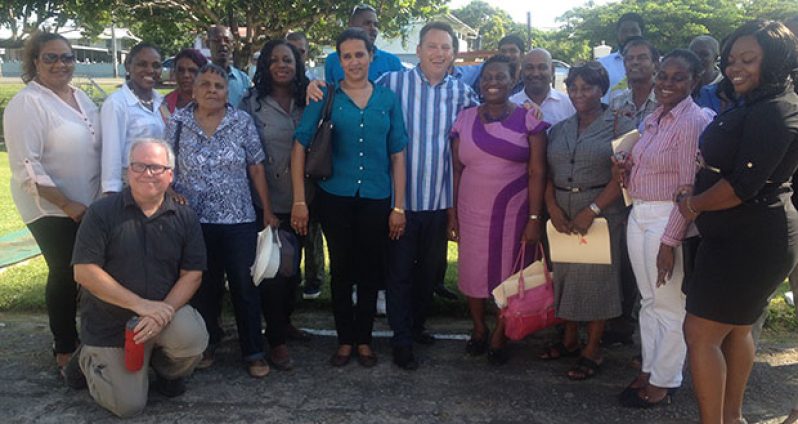DOZENS of municipal officials and regional and neighbourhood councillors are now better equipped to deal with the issues of governance and leadership, after participating in a series of professional enhancement training exercises conducted by the Caribbean Local Economic Development Project (CARILED), in conjunction with the Canadian Government and the Federation of Canadian Municipalities (FCM).Targeting councillors from all administrative regions, the training began on August 15 at the Umana Yana, and continued on August 16 and 17 at Herdmanston Lodge. The sessions concluded on August 19 at the GuySuCo Apprentice Hostel at Port Mourant, Corentyne, Berbice.

BEST PRACTICES
Objectives of the training were to deepen councillors’ understanding of community engagement; instill appreciation for effective leadership; strengthen capacity for strategic management, planning and community economic development; provide a review of the legal framework for local government; and inspire participants with examples of good international best practices of local government.
Economist in the Ministry of Communities, Jason Fraser, said the strategic objectives of the ministry can be achieved only through local authorities that have the capacity for growth. He pointed to the importance of Local Democratic Organs (LDOs) having autonomy, and added that issues affecting municipalities can better be handled at the level of the community, as against central government.
Fraser explained that in order to improve the environmental, institutional and fiscal sustainability of regions, the ministry is focused on strengthening leadership at the council level.
The economist said amalgamation of the Housing and Local Government and Regional Development ministries was a pivotal step in realizing these objectives.
National CARILED Coordinator Roger Rogers said the series of professional development training sessions was designed to enhance the knowledge and skill set of elected councils in the areas of leadership and governance.
He also underscored Government’s emphasis on delegating more primary functions to the local governance system in the context of enhancing the quality of service delivery at the local level.
MAP OF EXPERIENCE
Rogers noted that the training serves as a ‘map of experience’ that will provide guidance and add significant value to the work programme of serving council members, and he urged participants to return to their various communities and make meaningful contributions towards development of their communities.
The workshops were facilitated by Director General of the Regional Municipal County of Argenteuil in Quebec, Marc Carriere; and Mayor of Gore in Canada, Scott Pearce.
Carriere urged the community leaders to consider the wellbeing of the whole community, endorse a shared vision, include minority and marginalized groups, and respect differences of opinion.
“If you are sensitive to the needs of your community, you will have their support. Don’t be disconnected from your community. Reach out to those who are vulnerable, and ensure that all members of the community are involved in the process,” Carriere advised.
The Municipal Director also warned the councillors against practices which promote selfish motives, which can lead to failure; and he implored them to listen to their population, work together as a team, and document decisions to improve transparency.
“There must be a level of collaboration between the elected officials, the supporting staff, private sector, local authority, and other levels of government,” Carriere said.
He added that municipal leaders must remember that the health, safety and wellbeing of their population are the biggest assets to their constituency.
Meanwhile, Pearce, who drew heavily on his experience as a Mayor for the past 12 years, told the audience to ensure that by-laws are protected, since “we may want development, but not at the expense of the community.”
He applauded the extent of the involvement of youth and women at the local level, and reminded them to use their status to appeal to their peers.
USE SOCIAL MEDIA
Pearce encouraged councillors to use social media to reach their constituencies, ensure jobs remain at the local level, and recognize citizens who can be considered models.
Additionally, the Public Affairs Officer at the Ministry of Communities, Danielle Campbell-Lowe, reminded the participants to commit to the principles of good governance and accountability, and refrain from using their positions for personal gain. She encouraged them to tailor the tips and techniques learnt to the individual needs of their respective communities, in order to ensure that communities function in the most effective manner.
“At this juncture in our country’s history, Guyana is poised to develop its local governance structure and processes through collaboration at the national and community levels. In this regard, CARILED’s assistance with preparing local area economic profiles, guiding economic development, and providing technical support is truly invaluable,” she said.




.png)









